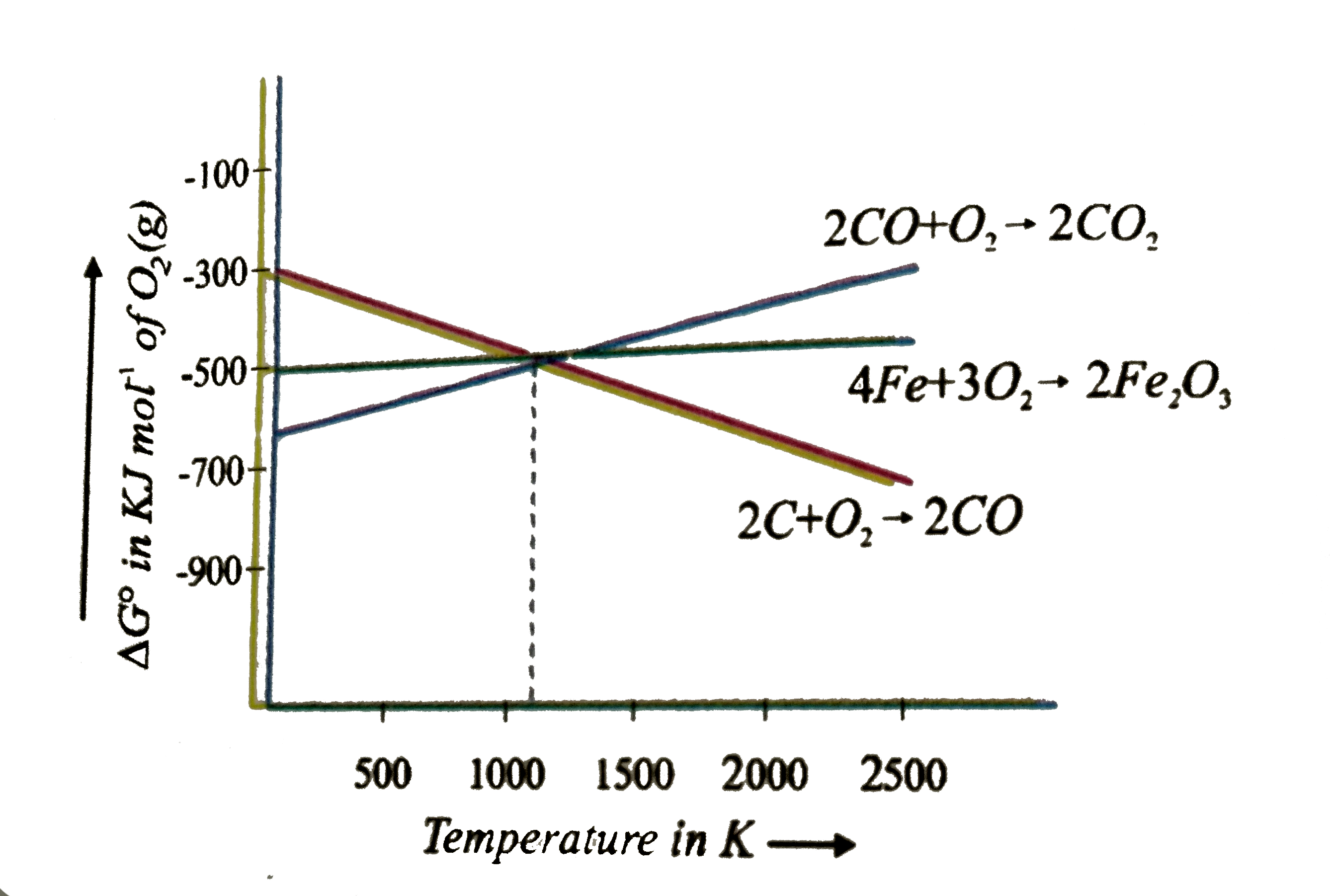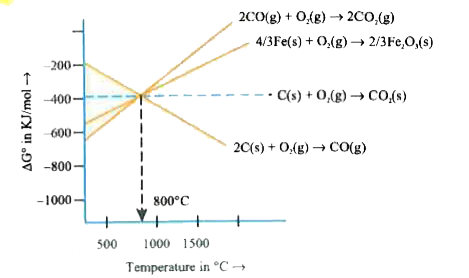Reduction of Fe2O3 with CO is done below 710∘C.
ΔfGӨ is negative at this temperature , this process is spontaneous.
If both (A) and ( R) are correct and ( R) is the correct explanation of (A).
If both (A) and ( R) are correct, but ( R) is not the correct explanation of (A).
If (A) is correct, but ( R) is incorrect.
If (A) is incorrect, but ( R) is correct.
The correct Answer is:A
Step by step video, text & image solution for Reduction of Fe_(2)O_(3) with CO is done below 710^@C. Delta_(f) G^(Ө) is negative at this temperature , this process is spontaneous. by Chemistry experts to help you in doubts & scoring excellent marks in Class 12 exams.
Updated on:21/07/2023Topper's Solved these Questions
- GENERAL PRINCIPLES AND PROCESS OF ISOLATION OF ELEMENTSBOOK - CENGAGE CHEMISTRYCHAPTER - GENERAL PRINCIPLES AND PROCESS OF ISOLATION OF ELEMENTSEXERCISE - Exercise (Integer)
27 Videos
- GENERAL PRINCIPLES AND PROCESS OF ISOLATION OF ELEMENTSBOOK - CENGAGE CHEMISTRYCHAPTER - GENERAL PRINCIPLES AND PROCESS OF ISOLATION OF ELEMENTSEXERCISE - Exercise (Fill In The Blanks)
30 Videos
- GENERAL PRINCIPLES AND PROCESS OF ISOLATION OF ELEMENTSBOOK - CENGAGE CHEMISTRYCHAPTER - GENERAL PRINCIPLES AND PROCESS OF ISOLATION OF ELEMENTSEXERCISE - Exercise (Single Correcttype)
106 Videos
- ELECTROCHEMISTRYBOOK - CENGAGE CHEMISTRYCHAPTER - ELECTROCHEMISTRYEXERCISE - Archieves Subjective
35 Videos
- GRIGNARD REAGENTS AND ORGANOMETALLIC REAGENTSBOOK - CENGAGE CHEMISTRYCHAPTER - GRIGNARD REAGENTS AND ORGANOMETALLIC REAGENTSEXERCISE - Exercises Archives (Linked Comprehension)
1 Videos
Similar Questions
Knowledge Check
Reduction of ZnO with carbon is done at 1100∘C.
Reason : ΔG∘ is negative at this temperature thus, process is spontaneous.AIf both assetion and reason are CORRECT, and reason is the CORRECT explanation of the assertionBIf both assertion and reason are CORRECT, but reason is NOT the CORRECT explanation of the assertionCIf assertion is CORRECT but reason is INCORRECTDIf assertion is INCORRECT but reason is CORRECTAssertion : Reduction of ZnO with carbon is done at 1100∘C.
Reason : At this temperature, ΔG∘ is negative and the process is spontaneous.ABoth assertion and reason are correct statements, and reason is the correct explanation of the assertion.BBoth assertion and reason are correct statements, but reason is not the correct explanation of the assertion.CAssertion is correct, but reason is wrong statement.DAssertion is wrong, but reason is correct statement.Direct reduction of Fe2O3 by CO is possible at temperature.
Aless than 1123 KBequal to or less than 1123 KCmore than 1123 KDequal to or more than 1123 K.
Assertion. Both C and CO can reduce FeO to Fe but at temperatures above 1073 K it is C which is a better reducing agent than CO while below 1073 K, it is CO which is a better reducing agent than C.
Reason. Above 1073 K, ΔfG∘ for CO from C is more negative than that of FeO from Fe while below 1073 K, ΔfG∘CO2 from CO is more negative that that of FeO from Fe.
View SolutionFe2O3 reacts with excess CO at a high temperature according to the equation below:
Fe2O3+3CO→2Fe+3CO2
If 6.5-0g of Fe2O3 yields 3.85g of Fe, what is the percentage yield of the reaction ?
View SolutionReduction of Fe2O3 with CO is done below 710∘C.
ΔfGӨ is negative at this temperature , this process is spontaneous.
View SolutionCorrect statements from the graph

I) Above 1073 K,ΔG0 for the formation of F2O3 is less negative than ΔG0 for the formation of CO from carbon
II) Above 1073K, Carbon can reduce Fe2O3
III) Below 1073K, CO can reduce Fe2O3
IV) In blast furnance, reduction of Fe2CO3 occurs in different temperature ranges with below 1073K by CO (or) above 1073 K by carbon
View SolutionCorrect statements form the graph

I) Above 1073K, ΔG0 for the formation of Fe2O3 is less negative than ΔG0 for the formation of CO from carbon
II) Above 1073K, Carbon can reduce Fe2O3
III) Below 1073K, CO can reduce Fe2O3
IV) In blast furnace, reduction of Fe2O3 occurs in different temperature ranges with below 1073K by CO (or) above 1073K by carbon
View Solution
